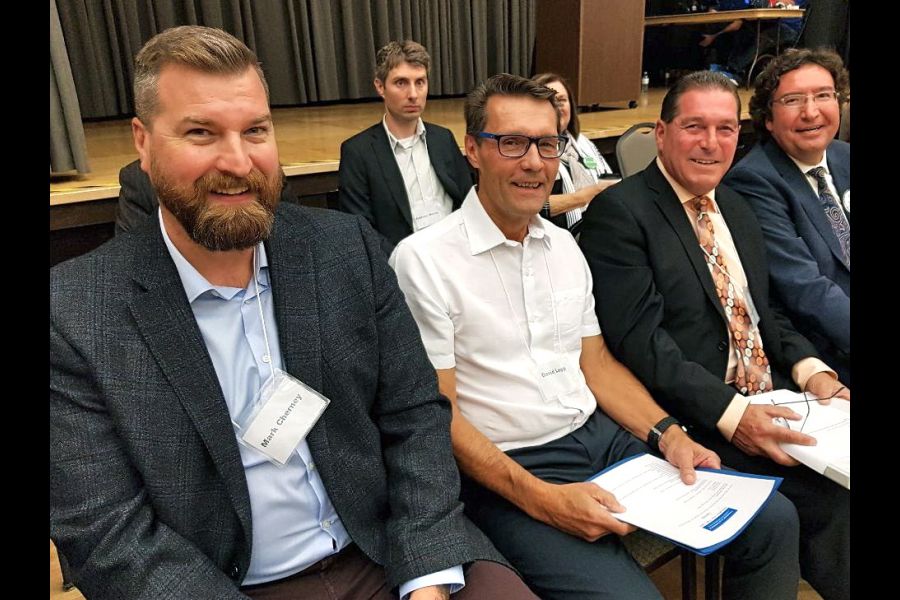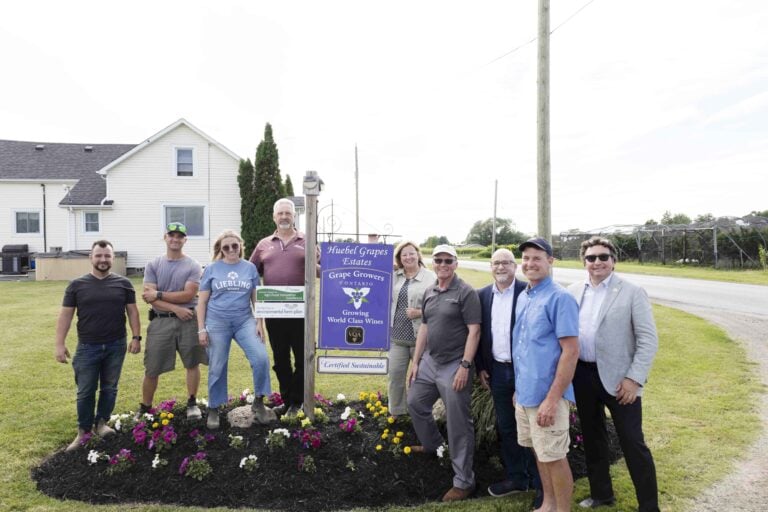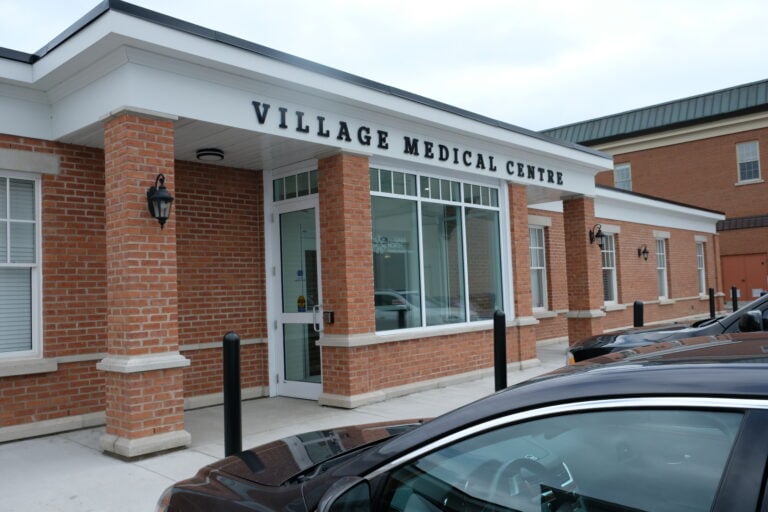As a Regional candidate Dave Lepp reminds voters every chance he gets that of the four candidates hoping for a seat at the Regional council table, only one will be elected.
Lepp has spoken to people who think they can vote for two of the four candidates, so when he spoke at the NOTL Chamber of Commerce candidates meeting Thursday, he reminded residents they get one vote for Regional councillor.
The other NOTL representative at the Regional council table is the lord mayor.
The four candidates who want to represent NOTL at the Region were invited to the community centre Thursday to answer the same question posed to all candidates — if elected, what would they do to support business during the next term of council.
Mark Cherney said he was raised in a family that operated a small business in NOTL, Cherney's Flowers and Gifts, now Regal Florists. Running a business means long hours, tireless work, and doesn't always offer a great return at start-up, he said.
HIs family worked hard, and with the support of the community was able to build a successful business, which created employment for many residents, he said.
Cherney told the audience of about 200 people he has a plan he believes would have a positive impact on the business community and neighbourhoods in NOTL.
For starters, he believes in tax fairness. NOTL pays a large portion of its property tax to the Region, and so deserves to receive a fair share of services, he said, including Infrastructure improvements for the already-congested Regional Road 55, on-time garbage collection and a fair fee structure for police services — all of which would help the business community.
He wants a managed traffic plan to benefit residents and businesses, and hopes to give each of the smaller communities “a greater voice. Each community of NOTL has unique needs,” he said, “and they need to be spoken loud and clear. We cannot be drowned out by the region.”
NOTL is a premier tourism destination in the region because of what local businesses have to offer, he said. “We need a Regional council that is providing infrastructure and support to our local businesses while keeping our friends and neighbours safe.”
Cherney said he's spent his adult life advocating for local workers — they do the work properly, safely, and on-budget, and put money back into local businesses. He promised to speak up for local workers and ensure they're working on local projects. He believes overspending on Regional infrastructure “is costing taxpayers money and skilled trade workers good jobs.”
Supporting business means also supporting farming families and the agri-food and tourism sectors, said Cherney. While the Niagara Peninsula Conservation Authority has been in the news a lot lately, his concern is that the organization is not doing enough to put farmers' needs on their agenda, to protect agricultural land and collect the data they need to expand farms and recognize problem areas “before they become an issue. We're paying tax dollars for these organizations and they need to put the needs of our community first.”
Cherney said he will stand to protect the unique character, architecture and heritage of NOTL. “We won't get visitors down here supporting our businesses if our community looks like a big city landscape. By bringing residents and businesses into the conversation and putting them in the forefront, he said, “we will find the balance to grow while protecting our heritage.”
Lepp is a life-long resident of NOTL who has had “the wonderful opportunity to live, work and play” in town and has been been involved in governing it at both the local and regional levels.
“I consider myself a team player and I learned long ago to work with other community representatives for the best outcome for the taxpayers,” he said. “We need to work together.”
The Region, he explained, “is responsible for a lot of the big things,” including major roads, sewer plants, water lines, nursing homes and transit, which will be a bigger part of the budget with the arrival of GO transit. The Region also looks after policing, garbage and recycling, and provides planning and cultural expertise and some health care services.
The Region also receives a “giant share” of taxes, he said.
About half of the Regional budget goes to cover the increasing cost of policing, said Lepp, leaving very little room to maneouver in the other half. If elected, he will be asking for more police presence in the community, and to keep tax increases to the cost of living or less.
Regional roads take up the second largest portion of budget, and Lepp said he would support more small roundabouts to keep traffic moving through the intersections where congestion starts. More communities are moving toward traffic circles, which are becoming popular in other parts of the region and the rest of Ontario, helping to make drivers more familiar with them.
Lepp would like to see the Region consider water lines along Lakeshore Road from Read Road to Four Mile Creek Road, which would benefit many in the business community. There are enough greenhouses, wineries, fruit-packing facilites and homes to make a good case for a watermain extension, and all of the firelanes off Lakeshore Road exist on cisterns and wells. All need potable water, he said. “I will lobby for that in the five-year budget.”
And if NOTL wants GO transit to work in the region, “we need all 12 municipalities on the same page, working toward the same common goal.” It would benefit all communities of NOTL, he said, allowing workers and visitors “to leave their cars at home and relieve congestion.”
The last time Chuck McShane was at the community centre addressing an audience was in May during the provincial election, running as a Progressive Conservative. “Although I was unable to secure a seat at Queen's Park, campaigning to represent my home town taught me something more important about its residents. You sincerely care.”
Because residents care about their past, he will ensure heritage is a top priority at the Region, he said. Because residents care about the present, he will ensure taxes are kept low, the influx of traffic is managed, and more seniors housing options will be available. And because residents care about their future, he promised to ensure Regional council is fiscally responsible, employs independent value-for-money audits, and ensures residents' dollars are spent intelligently, steering clear of debt and deficit.
He promised to make sure businesses can thrive in town, in which there would be no community centre, double pad arena, or Memorial Park with new grass without small businesses.
“We need to support individuals who have put their houses on the line, indebted themselves to put youth and even seniors to work,” he said. Before looking at bringing new businesses to town, “all the wrongs” need to be straightened out, including the red tape, taxes, and every barricade put in front of the business community. “Ninety per cent of local business owners are our neighbours. They sponsor our children to play hockey, they sponsor our children to play soccer, they sponsor our parades,” said McShane, asking the town to support them by shopping at their stores. “I want to thank every business owner,” he said, adding “I will be there to help get rid of red tape.”
Gary Zalepa Jr. began working in real estate with his father on the main street years ago, and is now in corporate management in real estate, working mostly from home. He has 15 years of experience in governance, sitting on local boards and committees, and spent six years on Town council. He feels it's time to get back to doing something good for the community, he said. “And I think I can. I'm not happy with the situation at the Region, I'm not happy with the behaviour, I'm not happy with the partisanship. It's got to stop.”
His track record on council shows he knows how to do the work, comes prepared, speaks to residents, makes decisions, and has a “key knowledge of local issues,” he said.
More work is needed on Regional infrastructure, he said. Roads and road safety are problems because the Region's capital budget hasn't kept up with NOTL growth.
The Region needs to work on transportation into and and around Niagara, including bringing the GO train to help clear up “clutter” on the QEW. “The GO train has to happen,” said Zalepa, and the key to making it happen is integrated transportation across Niagara, getting more users to GO trains. It's also important to get express trains to the region, he said.
Zalepa's other issue to attract businesses to town is to look at the Region's competitive advantage. “We're not winning on this,” he said. Other regions, such as Peel, York and Waterloo are winning the contracts and attracting investors. “Why are we not?”
He wants a competitive review on development charges, planning development fees, planning processes, tax competitiveness, site availability, how the Region is promoted “and how we get a shovel in the ground. I want to understand why Niagara is not first on the list. This is a great place to live. We know that and we need to work on that.”
He wants the opportunity to work with the lord mayor and council, to have a strong voice so the Region understands what makes NOTL a great place to live and respects the town's contribution. “Please put me back to work at the region for you.”










